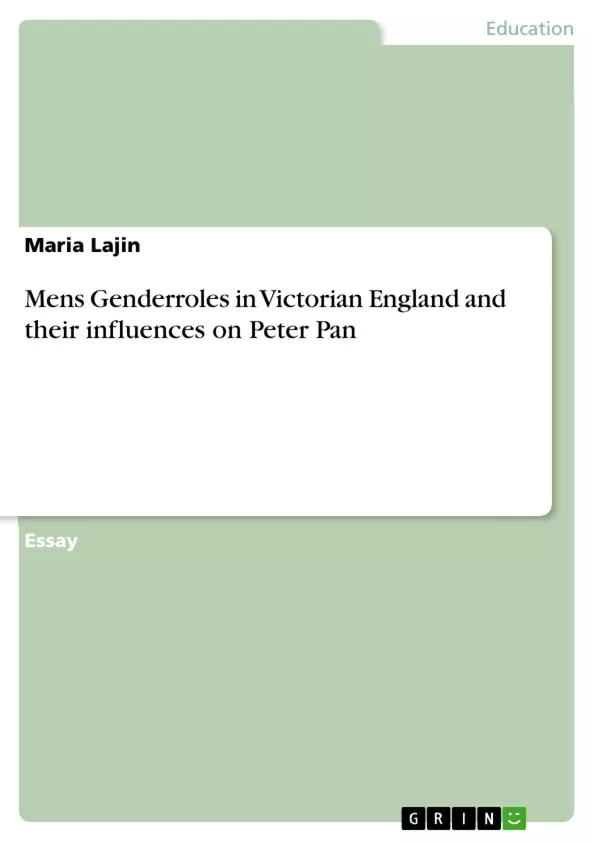This text analyses the gender roles of people in Victorian England and in Peter Pans Neverland. The Play Peter Pan was first published in 1904, the period where the Victorian Rules of society began to change slightly, and the Edwardian way of life became the canon. Men and Women roles in Victorian and Edwardian England, or in any era, were not the same throughout the different social classes. Men in royalty had different roles to fulfill than middle or lower-class Men.
Table of Contents
- Introduction
- Gender roles of Men in the Victorian Era
- Men also need to be strong and tough, they can't show any weakness.
- In the first Act the Darling Children are playing to be their Parents.
- A little further in the first Act you can see, that Mr. Darling sees his authority in the House weakened by Nana, the Dog.
- Gender roles in Neverland
- The Gender roles in Neverland are like the ones Great Britain of the Novel, but not the same.
- Upon their arrival in Neverland the Lost Boys say, that they have built a House for Wendy.
- Conclusion
Objectives and Key Themes
This paper examines the portrayal of men's gender roles in Victorian England and their influence on the character of Peter Pan in J.M. Barrie's play. The author compares the "real world" setting of the Darling family home with the fantastical world of Neverland to explore how societal expectations shape masculinity in both environments.
- Victorian and Edwardian gender roles
- The influence of societal expectations on masculinity
- The portrayal of men's roles in the "real world" and Neverland
- The relationship between masculinity and power
- The role of childhood and imagination in shaping gender identity
Chapter Summaries
- Introduction: This section sets the historical context for the analysis, introducing the Victorian and Edwardian eras in England and outlining the changing social norms of the time. It also establishes the importance of examining gender roles within different social classes.
- Gender roles of Men in the Victorian Era: This section explores how the play reflects Victorian expectations of masculinity. The author analyzes the character of Mr. Darling, focusing on his portrayal as the strong, stoic head of the household. The section also examines how the play presents the societal value placed on boys and the importance of having male heirs.
- Gender roles in Neverland: This section examines how the play's portrayal of gender roles in Neverland differs from those in the "real world." The author explores the dynamics between Peter Pan and the Lost Boys, analyzing how they exhibit both traditional and unconventional gender roles. The section also examines how Wendy's presence disrupts the established order of Neverland.
Keywords
The key terms and concepts explored in this work include Victorian and Edwardian gender roles, masculinity, childhood, imagination, power, societal expectations, and the comparison between the "real world" and Neverland. The analysis focuses on how these themes are reflected in the characters and plot of J.M. Barrie's play "Peter Pan."
Frequently Asked Questions
How are men's gender roles portrayed in Peter Pan?
The play reflects Victorian expectations where men are expected to be strong, stoic, and authoritative heads of the household, as seen in the character of Mr. Darling.
What is the difference between gender roles in London and Neverland?
While Neverland mirrors some British societal rules, it also allows for unconventional dynamics among the Lost Boys, though they still seek a 'mother' figure in Wendy.
Why does Mr. Darling feel his authority is threatened by the dog, Nana?
In the Victorian context, male authority was paramount; Mr. Darling's struggle with the nursery dog symbolizes his insecurity about his status and control within his own home.
How does the play address the transition from the Victorian to the Edwardian era?
Published in 1904, the play captures a period of shifting social norms where rigid Victorian rules began to give way to slightly more modern Edwardian lifestyles.
Do social classes influence gender roles in the story?
Yes, the paper highlights that roles for men in royalty, the middle class, and the lower class were distinct, affecting how masculinity was performed and perceived.
What role does imagination play in shaping gender identity in Peter Pan?
The Darling children 'playing house' and the fantastical setting of Neverland show how children internalize and replicate the gendered behaviors of their parents through play.
- Arbeit zitieren
- Maria Lajin (Autor:in), 2018, Mens Genderroles in Victorian England and their influences on Peter Pan, München, GRIN Verlag, https://www.grin.com/document/538398



